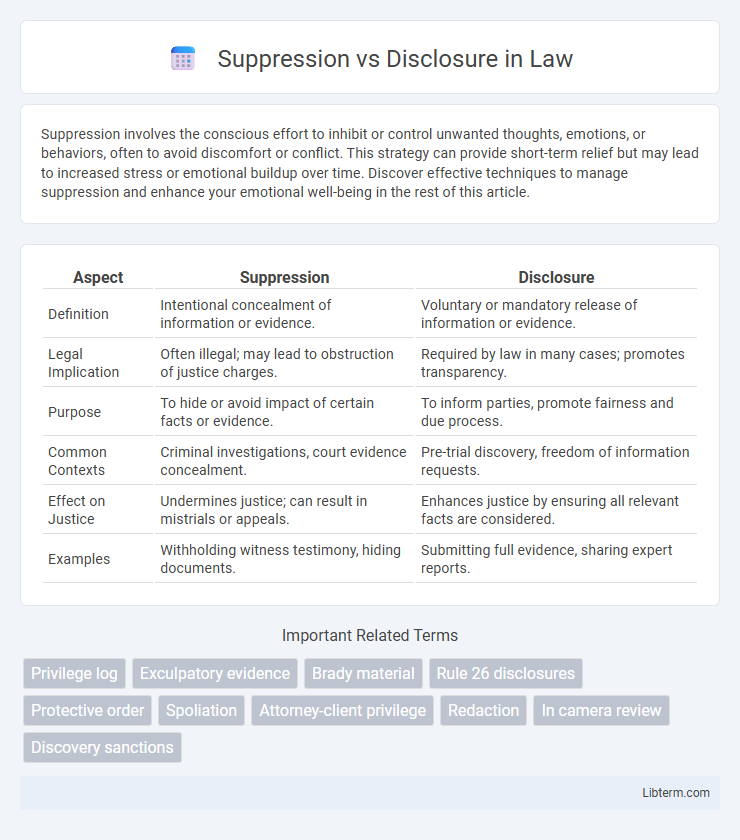Suppression involves the conscious effort to inhibit or control unwanted thoughts, emotions, or behaviors, often to avoid discomfort or conflict. This strategy can provide short-term relief but may lead to increased stress or emotional buildup over time. Discover effective techniques to manage suppression and enhance your emotional well-being in the rest of this article.
Table of Comparison
| Aspect | Suppression | Disclosure |
|---|---|---|
| Definition | Intentional concealment of information or evidence. | Voluntary or mandatory release of information or evidence. |
| Legal Implication | Often illegal; may lead to obstruction of justice charges. | Required by law in many cases; promotes transparency. |
| Purpose | To hide or avoid impact of certain facts or evidence. | To inform parties, promote fairness and due process. |
| Common Contexts | Criminal investigations, court evidence concealment. | Pre-trial discovery, freedom of information requests. |
| Effect on Justice | Undermines justice; can result in mistrials or appeals. | Enhances justice by ensuring all relevant facts are considered. |
| Examples | Withholding witness testimony, hiding documents. | Submitting full evidence, sharing expert reports. |
Understanding Suppression and Disclosure
Suppression involves intentionally withholding or concealing information to avoid negative consequences or protect privacy, often used in legal and psychological contexts. Disclosure refers to the act of revealing information, which can build trust, ensure transparency, and facilitate informed decision-making in personal, professional, or regulatory settings. Understanding the balance between suppression and disclosure is essential for effective communication, risk management, and ethical considerations across diverse fields.
Key Differences Between Suppression and Disclosure
Suppression involves intentionally withholding or concealing information to limit access or awareness, while disclosure refers to the deliberate release or sharing of information to inform or reveal facts. The key difference lies in control over information flow: suppression restricts knowledge to protect privacy or prevent harm, whereas disclosure promotes transparency and informed decision-making. Legal and ethical contexts often dictate when suppression or disclosure is appropriate, balancing confidentiality against public interest.
Psychological Impacts of Suppression
Suppression of emotions leads to increased stress levels and heightened risk of anxiety and depression due to unprocessed feelings accumulating over time. Chronic emotional suppression disrupts cognitive functioning and impairs memory by consuming mental resources needed for executive tasks. Research indicates that individuals practicing suppression exhibit reduced emotional regulation efficiency, resulting in increased physiological responses such as elevated heart rate and blood pressure.
Benefits of Disclosure in Personal Growth
Disclosure promotes emotional healing by allowing individuals to express and process hidden feelings, reducing psychological stress and fostering self-awareness. Sharing personal experiences encourages authentic relationships and social support networks, which are crucial for resilience and personal development. Increased transparency cultivates trust and accountability, empowering individuals to overcome past challenges and build confidence.
Risks Associated With Suppression
Suppression of information in legal and psychological contexts carries significant risks including the potential for lost evidence, compromised decision-making, and increased liability due to non-disclosure of critical facts. Suppressed data can lead to inaccurate outcomes, obstruct justice, and undermine trust in institutions, creating long-term reputational damage and legal consequences. Failure to disclose pertinent information often results in sanctions, penalties, and further ethical violations.
Disclosure and Its Effect on Relationships
Disclosure fosters trust and intimacy by promoting openness and vulnerability within relationships. Sharing personal thoughts and feelings encourages mutual understanding and emotional support, strengthening relational bonds. Consistent and honest disclosure reduces misunderstandings and resolves conflicts more effectively, enhancing relationship satisfaction.
Cultural Influences on Suppression and Disclosure
Cultural influences significantly shape suppression and disclosure patterns by dictating acceptable emotional expressions within societal norms. In collectivist cultures, suppression is often encouraged to maintain group harmony and avoid conflict, whereas individualistic cultures promote disclosure as a means of personal authenticity and emotional relief. Cross-cultural studies reveal that these norms impact psychological well-being, with suppressed emotions linked to increased stress and disclosure associated with social support and resilience.
Strategies for Healthy Disclosure
Effective strategies for healthy disclosure emphasize timing, context, and emotional readiness to ensure clear communication and mutual understanding. Prioritizing empathy and active listening establishes a safe environment that encourages openness and reduces potential feelings of judgment or rejection. Incorporating gradual sharing and respecting personal boundaries enhances trust and fosters stronger interpersonal relationships.
When Suppression Might Be Necessary
Suppression becomes necessary when disclosing information could cause harm, violate privacy, or compromise security, such as in sensitive legal cases or protecting vulnerable individuals. In medical records, suppression helps maintain patient confidentiality when data releases could lead to discrimination or stigma. Organizations implement suppression protocols to balance transparency with safeguarding critical or sensitive information from unintended exposure.
Balancing Suppression and Disclosure for Wellbeing
Balancing suppression and disclosure is crucial for maintaining psychological wellbeing, as excessive suppression can lead to increased stress and emotional distress, while thoughtful disclosure promotes emotional release and social support. Research shows that strategic self-disclosure improves mental health by fostering authentic connections and reducing internalized negative emotions. Effective emotional regulation involves recognizing when to withhold feelings to preserve resilience and when to share to enhance interpersonal understanding and coping mechanisms.
Suppression Infographic

 libterm.com
libterm.com